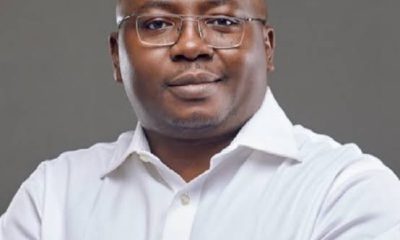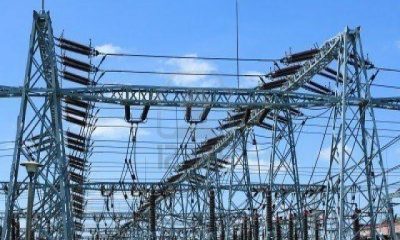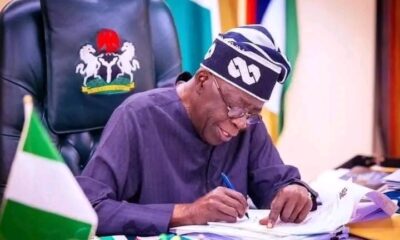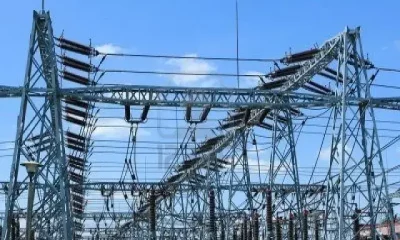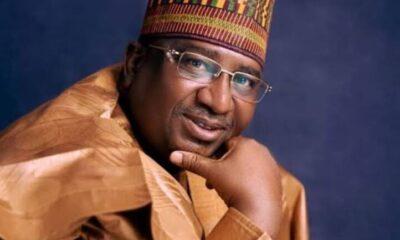News
El-Rufai proposes stringent measures for electricity sector

Former Governor of Kaduna State, Nasir El-Rufai and a ministerial nominee has proposed stringent measures in the electricity sector to help boost the sector.
It includes hardline stance against those that bypass metering.
He made this known during the screening of ministerial nominees submitted to the Senate by President Bola Tinubu.
According to El-Rufai, the electricity supply situation in Nigeria has defied every government for 60 years.
“Metering is a big issue, a lot of progress has been made by some of the Distribution Companies (Discos).
“In the last three or four years with the support of the CBN and the World Bank, every household should have been metered, every business should be metered.
“Estimated billings is not acceptable. But in addition, Nigeria must take a hard stance against those that steal electricity.
“Those that get electricity by diverting cables; not paying, we must take a hardline stance against it if this sector is to work.
“A lot of advocacy is necessary. People believe that water and electricity should be free, the social services, but they are not; they cost money to produce.
“The least you can do is pay back for the cost of production and handing it to the private sector, they need some return on its investment over and above the cost of production.”
The nominee also raised the issue of distribution saying that in 2013 Discos were privatised.
“We privatised our distribution companies, 11 of them; 60 per cent to the private sector, 40 per cent to be owned by government.
“The idea is that the 40 per cent is supposed to be listed on the foreign exchange so that every Nigerian will be a shareholder in it.
“But that has not happened, 10 years after privatisation, the government is still subsidising electricity in one way or the other.
“The last time we checked it was about N1.6 trillion in the privatised environment. This is unsustainable and unacceptable.”
He, however, said that President Bola Tinubu was committed to ensure Nigeria has stable and reliable electricity supply.
“This is because without electricity, industrialisation is a pipe dream. Without electricity, even agriculture today is not a viable proposition.
“So he is committed to that and he has asked me to work with him to address these problems. So I will do my best to address them.”
Sen. Sunday Karimi (APC-Kogi) while commenting on the nominee said that “your performance in any office you served has been outstanding.
“Your record is there. In FCT as a minister your record is there and as two term governor of Kaduna State.
“I have a very strong petition against you that bothers on security, unity and
coerciveness on the nation and I think that petition has to be considered along this screening exercise.”
Reacting, Sen. Sani Musa (APC-Niger) said that the nominee has credibility when it came to performance on every assignment he had undertaken for this country.
“And he is not different from any other one that have performed in other places.
“There had been two former governors that had been here and there was a precedence and that precedence as a convention in chambers like this should be sustained.
“And such, I want to propose that El-Rufai too should take his bow.”
While trying to respond to the petition, El-Rufai said “The distinguished senator from Kogi who talked about a petition against me….
The President of the Senate, Godswill Akpabio immediately interjected saying “Perhaps I should inform that I have received petitions from many other people in respect of other nominees but this is not where we are to deal with petitions.
“Our job here is to screen and then of course we can refer petition to where petitions will be dealt with.
“These are the nominees of Mr President. If it is something that is a formal petition before the Senate, we will look at it formally. But there are certain petitions we have to refer back to either the Presidency or security agencies to look at and that has nothing to do with us.
“I think at the time we are going into the issue of confirmation and approval, we will be so advised. So I will want to plead with my brother to take a bow.”
News
Woman killed while crossing road in Anambra

The Federal Road Safety Corps (FRSC), Anambra State Sector Command, has confirmed the death of a woman in an accident at Okpoko Market on the Asaba-Onitsha Road.
The Sector Commander, Mr Adeoye Irelewuyi, who confirmed the accident to journalists in Awka on Thursday, said that the woman was hit while she was crossing the road.
He said that the accident, which occurred on Wednesday, involved a commercial tow truck with registration number XA550BMA.
“Eyewitness report reaching us indicates that the truck was towing a vehicle in an uncontrollable speed along the axis.
“The vehicle that was being towed got detached from the tow truck.
“It hit and killed a female adult, who was said to be crossing the road, while the tow truck continued its movement.
“FRSC rescue team came to the scene and took the woman to Toronto Hospital, Onitsha, where she was confirmed dead and her body deposited at the hospital’s mortuary,” he said.
While sympathising with the family of the dead, the sector commander urged motorists, especially tow truck drivers, to exercise a high level of professionalism.
He also urged the drivers to always use standard equipment and avoid speeding.
News
LASG’s maize palliative impactful, says poultry association chair

The Chairman, Poultry Association of Nigeria (PAN), Lagos State Chapter, Mr Mojeed Iyiola, said the state government’s maize palliative to members of the association made a positive impact on the sector.
Iyiola said this in an interview with the News Agency of Nigeria (NAN) on Thursday in Lagos.
“We received about 150,000 tons of maize in February from the Lagos State government as palliative to cushion the effect of high feed prices.
“The major benefit of the palliative is that it actually cushioned the cost of production for most poultry farmers in the state.
“The palliative was beneficial as it made the cost of some poultry produce, especially eggs to drop,” Iyiola said.
He noted that prior to the palliative, a crate of egg was sold between N3,500 and N3,700 at the farm gate, but after the palliative, it now sells between N3,200 and N3,400.
According to the PAN chair, retailers and middlemen who sell from N3,800 to N4,200 do that for their personal gain.
“We have urged our members to sell their eggs at reasonable prices following the receipt of the palliative from the government.
“We appreciate the Lagos State government for the palliative but we also urge the federal government to do likewise, to further reduce the cost of production in the sector.
“This will consequently lead to drop in the prices of all poultry produce across board,” he said.
He said the palliative was shared among financial members of the association at no extra cost.
“As an association we shared the grains equally across PAN’s eight zones in the state equally. We also mandated each zone not the sell even a grain of the maize.
“We, however, considered new poultry farmers who wanted to the join the association as beneficiaries of the palliative,” said Iyiola.
He noted that through the palliative, more poultry farmers were recruited into the association.
“The maize was shared only to poultry farmers and not feed millers, it is the major component of poultry feed formulation,” he said.

